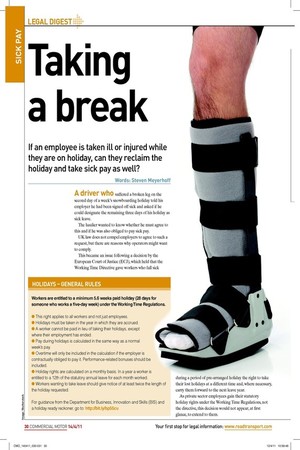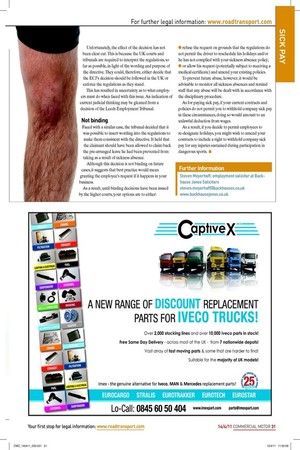Taking a break
Page 19

Page 20

If you've noticed an error in this article please click here to report it so we can fix it.
If an employee is taken ill or injured while they are on holiday, can they reclaim the holiday and take sick pay as well?
Words: Steven Meyerhoff A driver who suffered a broken leg on the second day of a week’s snowboarding holiday told his employer he had been signed off sick and asked if he could designate the remaining three days of his holiday as sick leave.
The haulier wanted to know whether he must agree to this and if he was also obliged to pay sick pay.
UK law does not compel employers to agree to such a request, but there are reasons why operators might want to comply.
This became an issue following a decision by the European Court of Justice (ECJ), which held that the Working Time Directive gave workers who fall sick during a period of pre-arranged holiday the right to take their lost holidays at a different time and, where necessary, carry them forward to the next leave year.
As private sector employees gain their statutory holiday rights under the Working Time Regulations, not the directive, this decision would not appear, at irst glance, to extend to them. Unfortunately, the effect of the decision has not been clear cut. This is because the UK courts and tribunals are required to interpret the regulations, so far as possible, in light of the wording and purpose of the directive. They could, therefore, either decide that the ECJ’s decision should be followed in the UK or enforce the regulations as they stand.
This has resulted in uncertainty as to what employers must do when faced with this issue. An indication of current judicial thinking may be gleaned from a decision of the Leeds Employment Tribunal.
Not binding
Faced with a similar case, the tribunal decided that it was possible to insert wording into the regulations to make them consistent with the directive. It held that the claimant should have been allowed to claim back the pre-arranged leave he had been prevented from taking as a result of sickness absence.
Although this decision is not binding on future cases, it suggests that best practice would mean granting the employee’s request if it happens in your business.
As a result, until binding decisions have been issued by the higher courts, your options are to either: ● refuse the request on grounds that the regulations do not permit the driver to reschedule his holidays and/or he has not complied with your sickness absence policy; ● or allow his request (potentially subject to receiving a medical certiicate) and amend your existing policies.
To prevent future abuse, however, it would be advisable to monitor all sickness absences and remind staff that any abuse will be dealt with in accordance with the disciplinary procedure.
As for paying sick pay, if your current contracts and policies do not permit you to withhold company sick pay in these circumstances, doing so would amount to an unlawful deduction from wages.
As a result, if you decide to permit employees to re-designate holidays, you might wish to amend your contracts to include a right to withhold company sick pay for any injuries sustained during participation in dangerous sports. ■









































